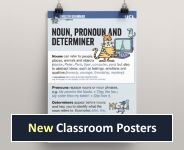Nouns: Count and non-count
Common nouns are either count or non-count. Count nouns can be ‘counted’, as follows:
one pen, two pens, three pens, four pens...
Non-count nouns, on the other hand, cannot be counted in this way:
*one software, *two softwares, *three softwares, *four softwares...
Welcome back!

Englicious is totally free for everyone to use!
But you will have to log in to see our library of teaching resources.
If you don’t have an account, that’s perfectly OK. You can register (for free).
It only takes a minute or two.
»
- Printer-friendly version
- Log in to view or leave comments

